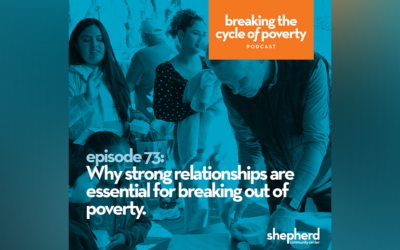As inflation bites, my neighbors water down their children’s milk to make ends meet.
Inflation is an insidious tax on people in poverty. And it’s one that forces my neighbors on the east side of Indianapolis to make heartbreaking choices each day.
I know parents who in recent months have begun to water down their children’s milk to make it go further. I’ve seen multiple families move into one small house because they can no longer afford a home of their own. And I’ve listened as mothers and fathers say they have no choice but to sacrifice caring for their own health needs so they can feed their children.
For my neighbors, each month brings a dilemma: Pay the rent and utility bills or buy enough healthy food, diapers and detergent to meet their children’s needs.
I know middle class and upper middle-class families aren’t shielded from the pain of inflation. With inflation surging at the fastest rate in 40 years, many of us feel the pinch whenever we go to the grocery store or fill our vehicles with gas.
But inflation hits lower-income Americans especially hard because they pay a high percentage of their income for housing, food, transportation, health care and other necessities. There’s little room in their budgets to absorb the surge in prices.
A Gallup survey published in December found that 71% of households with annual incomes of less than $40,000 said that recent price increases had caused financial hardships for their families.
“That compares with 47% of those in middle-income households and 29% in upper-income households,” Gallup reported. “Moreover, 28% of lower-income Americans describe the hardship they are experiencing as severe and affecting their ability to maintain their current standard of living.”
Thankfully, in Central Indiana, we have great organizations such as Gleaners and Midwest food banks, the Indy Hunger Network and Second Helpings that help families obtain nutritious meals. At Shepherd Community Center, we’re deeply appreciative of a recent $120,000 grant from Gleaners to expand our food pantry. It will make a significant, lasting difference in the lives of thousands of our neighbors.
We’ve also seen churches step up to help neighbors in need by funneling volunteers to Shepherd and other on-the-ground ministries and through significant donations of cash and supplies. And long-time corporate partners such as Elanco and Eli Lilly continue to make generous investments in our neighbors, our neighborhoods and our city.
But, as inflation surges at the highest rate we’ve seen in this century, the hardships continue to mount for families on the east side and throughout Central Indiana.
Even after the pay raises many workers have seen in the past year, inflation erased those financial gains and pushed families further behind. The U.S. Department of Labor reported that salaries increased an average of 4.7% in 2021. Yet, the Consumer Price Index shot up 7.5%. That means the average worker suffered a cut in buying power of more than 2%.
“In what was the best year for wage growth that we have seen in many, many years, it still comes up as a loss for many households,” Greg McBride, chief financial analyst for Bankrate, told CNBC. “Their expenses increased even faster and chewed up all of the benefit of whatever pay raise they had seen.”
Although government aid such as the Supplemental Nutrition Assistance Program (commonly known as food stamps) certainly helps, it’s not enough in many cases to cover our neighbors’ basic needs. And with Indiana’s pandemic-triggered increase in SNAP benefits scheduled to end in May, the gap will grow even wider.
It’s also important to remember that families can’t use SNAP benefits to pay for essential goods such as soap, shampoo, deodorant, detergent, feminine hygiene products, diapers and toilet paper.
Beyond food, the average price for a used car or truck increased by an incredible 40.5% last year. With gas prices now above $4 a gallon, the cost of getting to work and back, driving to a grocery store, or shuttling kids to school cuts deeper than ever into a family’s budget.
What can be done to help? The government, of course, has an essential role. On the national level, it’s imperative for the Federal Reserve, the Biden administration and Congress to act with a sense of urgency in slowing the rise in the cost of essential items like food and gas. On the state and local levels, we need continued investments in affordable housing and public transportation.
But government can’t do everything. Ordinary Hoosiers also must help by reaching out to serve neighbors in need and by supporting nonprofits and ministries that are in the streets helping people where they live. That old-fashioned idea of loving our neighbors is as relevant and important as it’s ever been.
I don’t want to hear another mother tell me she can’t afford to feed her children. I don’t want another father to neglect his own medical needs so his kids can have meat and milk.
Inflation is biting deep. Together, we can help ease our neighbors’ pain.
Jay Height is executive director of Shepherd Community Center in Indianapolis.
This article was originally published in The Indianapolis Recorder on April 1, 2022



